Papers by Dr Stanley Arumugam
Mental Health Matters, Vol 9.Issue 3, 2022
Spirituality is a vital variable in treating anxiety and depression, as documented in various cli... more Spirituality is a vital variable in treating anxiety and depression, as documented in various clinical studies. Despite this, there is still a hesitancy for both patients and clinicians to integrate spirituality into the treatment regime. In this article, I will explore, from a Judeo-Christian perspective, philosophical considerations impacting how we think about spirituality and healing and then explore a constellation of case studies.
I write from the perspective of a counselling psychologist also trained in post-graduate theology, Christian psychology and as a lay minister in the Methodist Church.
Part one - Even the toughest talking bosses wilt in the face of managing performance one-on-one.
Coaching is widely used in many organisations, yet the question of ROI (return on investment) see... more Coaching is widely used in many organisations, yet the question of ROI (return on investment) seems to be a conundrum. That coaching adds value is clearly not in question, as most coachees/clients will attest to. The gap, however, is in the business/mission connection. What is the value of coaching to performance improvement in the bottom line?
ISODC, 2020
OD as planned change is not as relevant for an unpredictable, agile world. What can we learn from... more OD as planned change is not as relevant for an unpredictable, agile world. What can we learn from cosmogenesis?
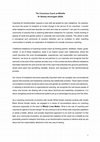
Coaching for transformation requires a new skill set guided by new metaphors. As coaches, we know... more Coaching for transformation requires a new skill set guided by new metaphors. As coaches, we know the power of metaphor to invoke change in the service of our coachees. I wonder what metaphors would best describe our work and roles as coaches? I am part of a coaching community of practice that is exploring alternative metaphors for coaches, mostly working in spaces of racial and gender justice in corporate and community contexts. This article is both a conceptual and community of practice reflection and an invitation to other coaching communities to amplify our exploration of metaphors for socially conscious coaching. Traditional metaphors of coaching include coach as thinking partner, facilitator, healer, guide, mentor. In all of these metaphors, there is an implicit 'power over' relationship, where the coach becomes the more knowledgeable, experienced, and responsible one inadvertently. However, we know as coaches that we are partners to our coachees and recognise that the real work is the work of the coachee and less ours. In this context are there different metaphors that better describe the work and the role of the coach that embodies this genuine partnership, where each party has something valuable, diverse, and necessary for the transformational process. Our choice of metaphors becomes especially important when we navigate new conversational spaces that business and leadership coaching has traditionally avoided. These topics include conversations of power dynamics about race and gender as manifest in racism and patriarchy. In adopting a feminist lens to organisational coaching, we recognise the real issues people of colour and women are dealing with is less about technical and leadership competence, it is about navigating social and institutional systems set up to advantage one group over the other. As a coaching community of practice with mostly White female coaches working with mostly Black African female clients, we engaged in a series of conversations about our coaching relevance especially on the back of #Black Lives Matter. What is the role of coaching and coaches as agents of social change? Do we continue to serve White male corporate capitalism or adopt a bolder, ethical, and socially responsive approach to our work as coaches? In this light, as a community of practice, we explored the metaphor of the coach as a midwife as one potentially powerful metaphor that helps us as transformative coaches to reframe what we are about and the responsibility attached to this new way of seeing.
Feminist leadership provides the principles, tools and practices for exploring deep structures in... more Feminist leadership provides the principles, tools and practices for exploring deep structures in organisations that are embedded in patriarchy. This approach provides a space and frame for analysing the incongruence between what we say and what we do; the gap between organisational rhetoric, policies and actual practice
Evaluating leadership coaching effectiveness in the international development sector. Published i... more Evaluating leadership coaching effectiveness in the international development sector. Published in the Association of Coaching's special edition: "coaching for social justice'.
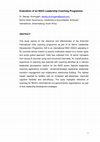
This study reports on the relevance and effectiveness of the ActionAid International (AAI) coachi... more This study reports on the relevance and effectiveness of the ActionAid International (AAI) coaching programme as part of its Senior Leadership Development Programme. AAI is an international NGO (INGO) operating in 52 countries whose mission is poverty eradication based on a human rights and social justice approach. Data was collected from 18 senior managers from across 8 countries using semi-structured interviews. An overall positive experience of coaching was reported with coaching identified as a relevant leadership development method for the INGO sector. Specific leadership coaching applications included: situational/strategic leadership; leadership transition management and collaborative relationship building. The highest impact reported by leaders was an increased self-awareness, improved cognitive flexibility and self-efficacy. The study highlights relevance of coaching for INGO’s (International non-governmental organisations) as part of their leadership development strategies.
Understanding the impact of racial dynamics is essential for effective coaching especially in the... more Understanding the impact of racial dynamics is essential for effective coaching especially in the South African context where coaching is fast becoming a preferred approach to individual empowerment and organisational transformation. Being mindful of our history and current socio-political context we approach coaching not as a value neutral intervention but one that is sensitive to and able to hold our rich and complex contextual dynamic.
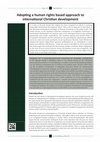
It is only in the past decade that religion has been recognised as critical to ensuring sustainab... more It is only in the past decade that religion has been recognised as critical to ensuring sustainable international development efforts. This is due in large part to the failure of the dominant development paradigm of Western secularism in the global South. This article focuses on the significant historical contribution of evangelical Christianity in international development and explores some of the ideological tensions that challenge partnership with secular organisations. The resulting separate and parallel efforts of evangelical Christianity and the international non-governmental organisations (INGO) sector are costly and counter-productive in serving the poor. Recently, many INGOs have adopted the human rights-based approach underpinned by its commitment to social justice and solidarity with the poor – values also central to the Bible. It will be argued that this shared approach could provide the necessary bridge to facilitate deeper engagement in the form of social action between secular development actors and evangelicals. The critical role of evangelical Christianity in addressing poverty as a human rights issue in South Africa is also dealt with briefly.
Despite the massive gains we have made in science, technology and business - we are still faced w... more Despite the massive gains we have made in science, technology and business - we are still faced with the problem of global poverty. Can coaching play a role in poverty eradication?
In this case study, Stanley Arumugam, Senior Leadership Advisor at ActionAid International (AAI) ... more In this case study, Stanley Arumugam, Senior Leadership Advisor at ActionAid International (AAI) shares his personal experience of the role of coaching as part of an integrated approach to change and leadership development. AAI is an international non-governmental organisation (INGO) working in 46 countries across the global South and North.
HR Future - http://www.hrfuture.net/, Sep 2012
What if we think of managers as meme machines, men and women who are basically transmitting memes... more What if we think of managers as meme machines, men and women who are basically transmitting memes in service of the organisation? The paradigm shifting movie, The Matrix transported us into a parallel world in which we (humans) are merely energy storing devices for another life force. We don’t know this and continue to live our daily existence in a seemingly normal world until one of us breaks through and discovers that our world is more illusion than reality; we have been caught up in the matrix.
http://www.hrfuture.net/, Feb 2013
One of the most liberating moments for me as a coach was getting to the place of choosing a style... more One of the most liberating moments for me as a coach was getting to the place of choosing a style and approach to coaching that aligns with who I am. At the end of the day, the coach has only their personhood to share with the other in an enabling journey. It’s
more than tools, techniques and models. The key coaching question is, “How can I be fully present to my coachee on their journey?"
PhD Community Psychology - University of Zululand, 2001
This essay explores the various models of community psychology as expressed in the mental health ... more This essay explores the various models of community psychology as expressed in the mental health model, the indigenous-ecological model, the organisational model, the social action model and the social community-liberatory model. Throughout this critical survey, it becomes clear that the underlying ideological assumptions of each model dictate the theory, method and practice. Implications and applications of the various models of community psychology are examined as they relate to the South African context.
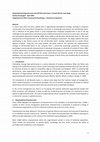
PhD Assignment - University of Zululand, Apr 1, 2001
In recent years there has been a global shift in organisational development strategy, resulting i... more In recent years there has been a global shift in organisational development strategy, resulting in companies moving away from hierarchical management structures to increasingly autonomous and self-directed teams. This is reflective of the global trends in social empowerment. Employee empowerment is one of the key challenges facing organisations transitioning from traditional hierarchical structures to more open, democratic and participative approaches (Dowling, 1999). Fisher (1993, p.14) describes self-directed teams as “the most advanced form of empowerment” on the continuum of employee involvement. This paper explores the issues contributing to the limited success for the self-directed team’s strategy implemented at a South African logistics company. Using the case study method, this paper explores and evaluates the implementation strategy of self-directed teams at this company from a community psychology perspective. Community psychology is concerned with empowerment of individuals and groups in a diversity of contexts (Tricket, 1996). It will be argued that a contextual application of empowerment initiatives is critical to the effectiveness of self-directed teams, which is sensitive to the unique multicultural and historical context of the South African workplace. This case study makes reference to ethnic groups in South Africa: Zulu (traditionally the workforce) and Afrikaans (traditionally the management group).
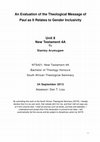
BTh Assignment - South African Theological Seminary , Sep 1, 2013
Much controversy has been sparked by St Paul’s message related to women in Christian leadership. ... more Much controversy has been sparked by St Paul’s message related to women in Christian leadership. This is exacerbated by the divergent gender positions attributed to Paul based on different readings of his texts on women, leadership and gender. Paul’s instructions to women in 1 Timothy 2:8-15 and in 1 Corinthians 14: 34-35, to be silent and prohibited from teaching are considered by some to be the most objectionable words in the Protestant canon (de Silva, 2004). These two 'limiting texts' read in isolation of the whole message of Paul may suggest that Christian leadership is exclusive to men. I find this conclusion problematic as it conflicts with the overall message of Paul who preached inclusiveness and equality in Christ. This essay will be focused on an exegesis of 1 Timothy 2:8-15 with a specific reference to Paul’s teaching on women in leadership in the context of biblical gender equality

Uploads
Papers by Dr Stanley Arumugam
I write from the perspective of a counselling psychologist also trained in post-graduate theology, Christian psychology and as a lay minister in the Methodist Church.
more than tools, techniques and models. The key coaching question is, “How can I be fully present to my coachee on their journey?"
I write from the perspective of a counselling psychologist also trained in post-graduate theology, Christian psychology and as a lay minister in the Methodist Church.
more than tools, techniques and models. The key coaching question is, “How can I be fully present to my coachee on their journey?"
In March 2018, the Australian national ego was confronted by the Australian cricket’s ball-tampering scandal. What could possibly go wrong for the whole national team? At the time Michael Macaulay offered fascinating insights in six key integrity areas which I’ve expanded for organisational learning: